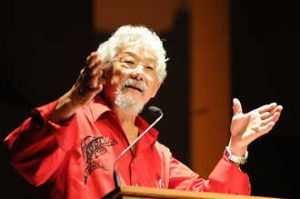
By Neale McDevitt
At 74, David Suzuki is in what he calls “the Death Zone.” But for a man who is in the home stretch, the legendary broadcaster, scientist and environmental activist sure is preoccupied with life.
“People say ‘No, no. Don’t say that!’ But there’s nothing morbid with saying that I’m going to die. We’re all going to die…it’s the nature of things,” Suzuki told a packed house at Pollack Hall on Sept. 28.
“But we have to face that and then get on with the most important aspect of our lives. I believe it is our duty, our responsibility as elders to sift through our experiences over our lifetime, our observations and thoughts to distill a legacy – a legacy that is worth passing on.”
That legacy is nothing less than the planet – a healthy planet, which is a tall order for a species that seems hell bent on wiping it out.
Taking the audience back in time, Suzuki said that the only reason early humans survived a hostile world was thanks to “a two-kilogram organ buried deep inside our head.
“But if we’re so intelligent, why do we destroy the planet… by turning it into a toxic dump?” he asked.
Part of the problem is what Suzuki called “our incredible appetite for stuff,” noting that every single item we buy comes with an ecological price tag.
“Technology, clothing, computers – everything we consume comes out of the earth and goes back into it when we are finished,” he said. “The very act of buying has ramifications that have ripples around the world.”
Rampant consumerism combined with the fact that we are “clever creatures without humility,” has led us to create the most unnatural of hierarchies in which we value the economy over the ecology. In this skewed matrix, industrialists see mountains, oceans and forests as stockpiles of precious metals, fish and lumber to be exploited for financial gain. And while the profit to be made is huge, the environmental cost is devastating.
In criticizing this “growth at all cost” philosophy, Suzuki took aim at Canadian and U.S. policies – naming Prime Minister Stephen Harper and U.S. Presidents Obama and George W. Bush as the prime examples of politicians who have placed short-term economic goals ahead of the long-term health of the environment.
“Commerce and the economy are not forces of nature. We can change them,” he said, noting that the economic crash of 2008 presented leaders with a golden opportunity to “toss the damn thing out and start again.”
Instead, huge sums of money were poured into the very institutions that had had caused the crash in the first place. “Remember Einstein’s definition of insanity is doing the same thing over and over again and expecting different results,” said Suzuki, garnering a round of enthusiastic applause from the audience.
It’s time, he continued, to “put the eco back into the economy.”
Speaking in broad terms, Suzuki laid out the blueprint that would allow us to step back from the brink of environmental disaster. He called for people to make a radical transformation in their personal philosophy so that they emphasize family and friends ahead of jobs and wealth, and to revere the Earth as the source of all life rather than the source of all profit. He called for people to move away from cities and to live within the cycles of nature rather than to impose our cycles upon it.
In closing, Suzuki called upon the elders of the world, like himself, to spearhead the movement to fight for a better world for their children and grandchildren.
“My generation and the Boomers that followed have lived like kings and queens. We’ve partied as if there was no tomorrow and we forgot to think about future generations. Well, that party’s over,” he said.
“It is time to sober up and clean up our mess… We have done it in the past and we can do it in the future. All it takes is the vision and the will to do it. So let’s get on with it.”
